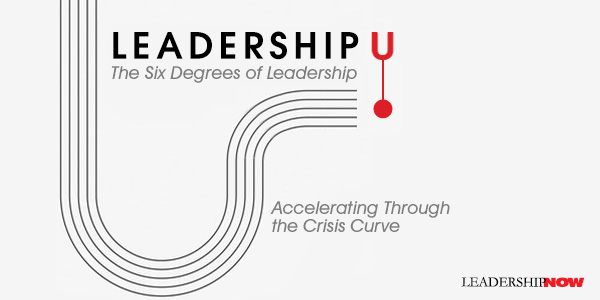 |
 |
01.25.21

Leadership U: The Six Degrees of Leadership
TO LEAD people from one place to another in good times and in challenging ones requires a framework like the one presented in Korn Ferry CEO Gary Burnison’s concise book, Leadership U: Accelerating Through the Crisis Curve. The framework is called, The Six Degrees of Leadership. These six degrees are mastered separately but work together in practice. Degree #1: Anticipate
Anticipating is 90% bottom-up and only 10% top-down. To anticipate, you need to make the hierarchy invisible. Take a total inventory across the organization as you listen for what people are thinking, feeling, fearing, and experiencing. Burnison says no matter the climate, the question is always, “What does this mean going forward?” Degree #2: Navigate
Impatience doesn’t get the job done. It inspires more fear than high performance, which can override critical thinking. Anybody who has gone into a skid on black ice can relate: your instinct is to slam on the brakes and jerk the wheel in the opposite direction. It takes a clear had to do the opposite—the counterintuitive—of steering into the skid to regain control. Degree #3: Communicate
When there is trust in what you say, there will be belief in what you do. That starts with modeling a “say/do” ratio of one-to-one. You do what you say and say what you mean. When you’re viewed as an authentic leader, people will not only trust your words and actions, they will also mirror what you say and do. Degree #4: Listen
What often can hold people back from giving honest feedback is the lack of perceived economic independence. Those over us control our resources. “Economic stability is the ultimate truth serum, and leaders need to recognize that.” As you listen, you need to distinguish between the urgent and the important. When a crisis hits, though, everything blurs as events and their implications constantly change. What’s important often becomes urgent, and the urgent becomes critical. You must delegate others to lead around a common purpose. Degree #5: Learn
The distance between your company and its competitors is not absolute; it’s relative. If you want to transform your organization, you must grow your organization through learning. Degree #6: Lead
In a world where so much has be reimagined, nobody has all the answers. This is not a time for individual heroism. It’s all about the team—and you need talented people around you. 
Posted by Michael McKinney at 07:46 AM
|
BUILD YOUR KNOWLEDGE
 

How to Do Your Start-Up Right STRAIGHT TALK FOR START-UPS 
Grow Your Leadership Skills NEW AND UPCOMING LEADERSHIP BOOKS 
Leadership Minute BITE-SIZE CONCEPTS YOU CAN CHEW ON 
Classic Leadership Books BOOKS TO READ BEFORE YOU LEAD |